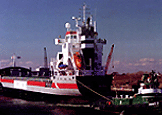Any vessel flying the United States flag is still covered by United States maritime law even while sailing in international waters. However, the intersections of domestic and foreign maritime law can prove complex, archaic, and confusing, even knowing you have the maritime laws of the United States on your side. Luckily, the maritime attorneys of O’Bryan Baun Karamanian have navigated these complicated waters before, and know how to steer your case to a successful resolution.
International Waters FAQs
What are international waters?
US maritime law defines “international waters” as any body of water outside the jurisdiction of the United States. International waters can include major oceans, seas, and even lakes in other countries that allow the passage of American-owned or -operated vessels.
In addition, international waters can be referred to by many different terms. Active travels through international waters can be referred to as “foreign voyages”, which means in the legal sense any voyage between a country covered by the Jones Act (such as the United States) and a country outside its jurisdiction. This distinction is important to make, as American maritime law can still apply to a vessel even while it travels through the waters of another country not covered by the same laws.
What laws apply in international waters?
Generally speaking, when a ship sails or works in international waters, any legal matter (including crew injury or illness) falls under the jurisdiction of the country whose flag it flies. Vessels flying the American flag in international waters are all covered by the Jones Act the same as any other American vessel, even if the voyage did not start in American waters.
As with cases within the borders of the United States, the Jones Act protects workers from unsafe working conditions, hazardous environments, improperly maintained equipment, and more. If you are injured while working on international waters or during a foreign voyage, the Jones Act may help you seek financial compensation for your illness or injury.
How is death handled on international waters?
Under the right circumstances, international waters law can help with untimely deaths and fatalities as well. Among the many different acts that make up maritime law in America, the Death on the High Seas Act directly applies to any maritime worker who dies in the line of duty. This act helps to cover any death found to be the fault of the shipowner, such as unsafe working conditions or errors in navigation. As with the Jones Act, these laws apply to any vessel flying the American flag, even if the death occurs in international or foreign waters.
How does maritime law work in international waters?
Even if your death or injury occurs in international waters, the Jones Act still entitles you to a trial in the federal courts of the United States. You are able to file your claim and open a case just like you would were the accident to have happened in American waters, and the act will allow you to seek financial compensation no matter where the injury took place – as long as the vessel is flying an American flag.
If you need the services of a maritime lawyer for an accident that occured in international waters, contact O’Bryan Law today.












